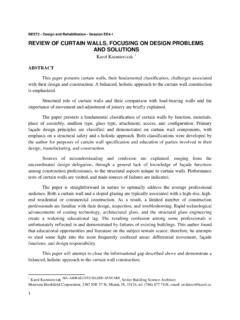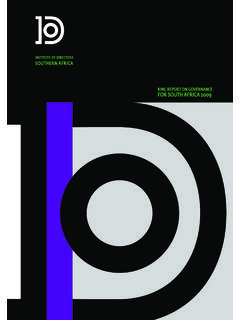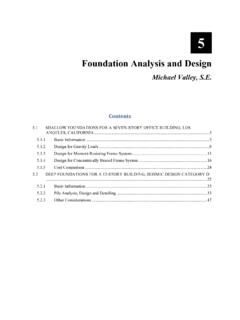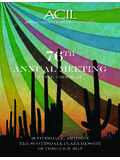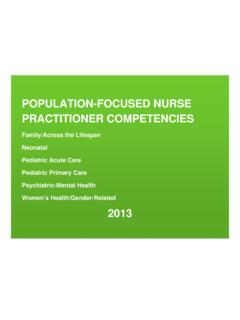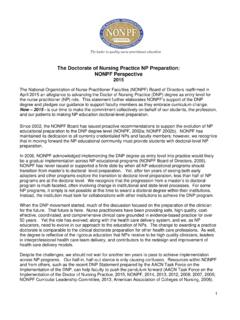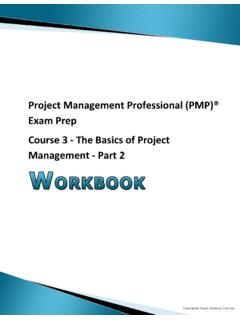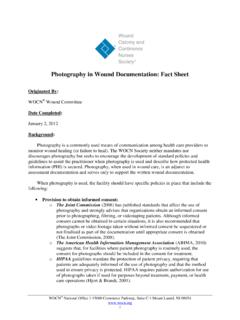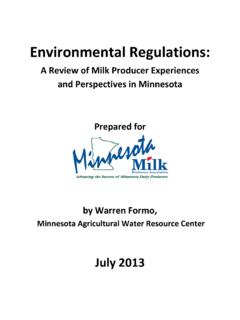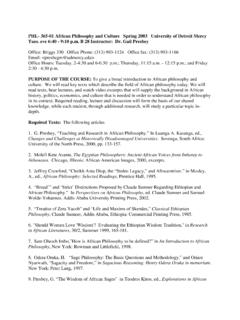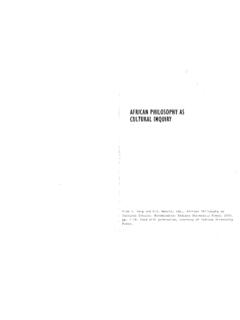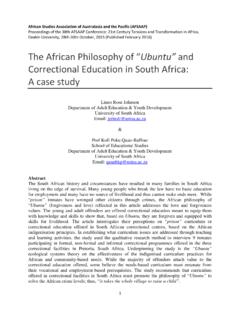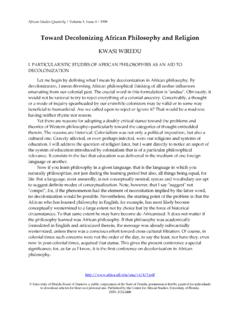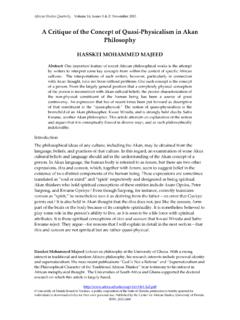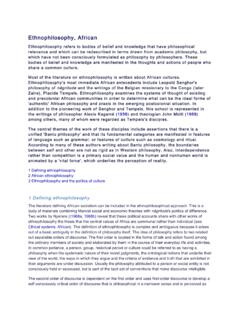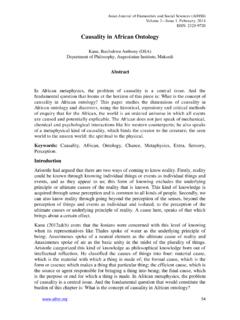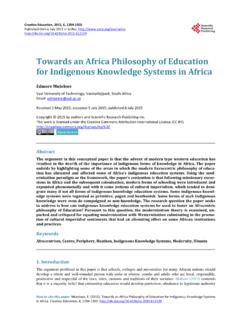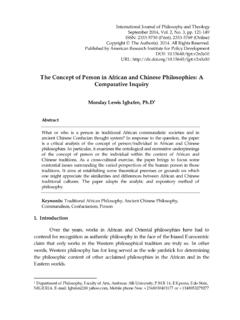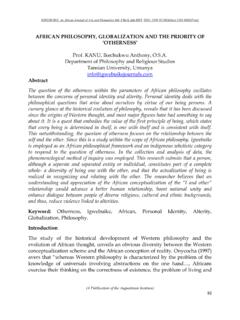Transcription of African Philosophy (UG) and (PG) - cdn.ymaws.com
1 African Philosophy Syllabus, p. 1. African Philosophy (UG) and (PG). Overview Since its inception in the mid-20th century, African Philosophy has become a full-fledged academic discipline. Many readers and anthologies, introductions, and other paedagogical publications have been published, along with a great number of texts striving to give an overview of the field, often in comparison with Western Philosophy or with philosophies from other regions of the world. African Philosophy has branched out to cover the philosophical activities of various groups: of people of African origin in the Diaspora (mostly the US), called "Africana Philosophy ", the philosophical thought of African women ("womanism"), African aesthetics, ethics, etc. This course gives an introduction to this discipline. In the first part of the term, we will look at "ethnophilosophy" as the discourse that started African Philosophy , based on the assumption that African thought is fundamentally different from Western Philosophy .
2 This belief shows in the oppositions through which African philosophical thought has been defined and characterized: communal, collective thought has been opposed to Western Philosophy 's individual thinkers;. emotionality to the West's analytical spirit; African concepts of time as circular and lacking a distant future dimension to the West's linear concept of time, etc. It is in reaction to these generalizing and often racist and/or Eurocentric conceptions that Africa's "professional philosophers" have launched their project of "conceptual decolonization" (Wiredu). In the second part of the course, we will explore the ideas of some of these "professional philosophers". The Sage Philosophy project of the late Henry Odera Oruka, which directly addresses the objections raised against "ethnophilosophy", will be a transition to the study of the thought of prominent contemporary African philosophers, such as Kwasi Wiredu, Valentin-Yves Mudimbe, Paulin J.
3 Hountondji, and Kwame Anthony Appiah. In an expressive phrase coined by Kwasi Wiredu, this is " African Philosophy in the making": looking for inspiration in African cultures, while firmly seated in Western-style philosophical discourse, its methods and standards. The topics that the course will examine include race, time, (economic, societal, intellectual). development, the connexions between African traditions and politics, and the possible links between African Philosophy and other expressions of ideas in Africa, in particular literature and film. Teaching 10 weeks teaching with 3 contact hours per week (2 hours lecture and 1 hour tutorial). The course is taught in Term 1 and focuses on Philosophy in Africa that is expressed in European languages. The course "Afrophone Philosophies" (UG) and (PG) builds up on this course in Term 2, focusing on the area of philosophies in African languages.
4 UG students taking this course should have completed either of the introductory courses on African culture or African languages, "Culture in Africa" (155900838) or "Language in Africa" (155900867). Exceptionally they may take " African Philosophy " without having taken either of these courses, after a consultation with the course convenor. PG students must take this course together with the course Afrophone Philosophies (PG) if they wish to take it as a major. The course can be taken on its own as a minor. Course objectives (UG). acquire solid knowledge of African Philosophy , its history, main topics, and its relationship to other philosophical discourses in the world (European philosophies, Intercultural Philosophy , Latin American Philosophy , etc.). African Philosophy Syllabus, p. 2. develop the ability of fundamental reflection and critical analysis of central philosophical issues develop a critical approach to the underlying cultural presuppositions of philosophical discourses develop oral presentations skills (gain practice for giving conference papers).
5 Develop writing skills (learn to produce high-quality academic articles). Methods of assessment (UG). TWO oral presentations of 10 minutes, one in the first half of the term and one in the second half of the term, discussing the essay topics prior to the submission of the essays. The students are required to prepare handouts and/or a short Powerpoint presentation for at least one of these presentations. The presentations should include a brief mention of the readings for the essays. These presentations are intended to help the students develop the practice of giving a conference paper. The presentations will account, respectively, for 5% and 10% of the total mark. TWO written analyses of readings of 500 words, to be submitted on the day of the lecture in Week 5 and in Week 11. Each of the analyses should cover ONE of the weekly topics covered respectively in weeks 1-5 and in weeks 7-11, the topics should be different from the essay topics, and the analyses should cover the required readings (listed under Readings) relevant to the topics.
6 Each of the analyses will account for 10% of the total mark. ONE essay of 2000 words to be submitted on Day 5 of Week 7 (after Reading Week), valued at 25% of the total mark, and ONE essay of 2500 words to be submitted on Day 5 of Week 1 of Term 2, valued at 40% of the total mark. The topics of the essays will be chosen individually by each student but based on a consultation with the course convenor and approved by the course convenor. The essays help the students develop the skills to write essays and academic papers. The first, shorter essay provides an opportunity to get early feedback so that BA students can improve their writing for the second, longer and higher valued essay. Course objectives (PG). acquire solid knowledge of African Philosophy , its history, main topics, and its relationship to other philosophical discourses in the world (European philosophies, Intercultural Philosophy , Latin American Philosophy , etc.)
7 Develop the ability of fundamental reflection and critical analysis of central philosophical issues develop a critical approach to the underlying cultural presuppositions of philosophical discourses learn to to give conference papers learn to to produce high-quality academic writing Methods of assessment (PG). ONE 20-minute oral presentation of the essay topics to be presented in the tutorial before the submission of the essays. The students must prepare handouts and/or a Powerpoint presentation as a basis for the oral presentation and must discuss the basic bibliographical sources for their essays in the presentation. This presentation is intended to help the students develop the practice of giving a conference paper and will account for 20% of the total mark. TWO written analyses of readings of 1000 words, to be submitted on the day of the lecture in Week 5 and in Week 11.
8 Each of the analyses should cover ONE of the weekly topics covered respectively in weeks 1-5 and in weeks 7-11, the topics should be different from the essay topics and should discuss ALL the required readings (listed under Readings) PLUS at least TWO. additional readings of about 30-50 pages each (selected from Additional Bibliography or independently found by the student) on top of the required readings. Each of the analyses will account for 10% of the total mark. African Philosophy Syllabus, p. 3. ONE 5000-word essay to be submitted on Day 5 of Week 1 of Term 2. The topic of the essay will be chosen individually by each student but based on a consultation with the course convenor and approved by the course convenor. The essay will account for 60 % of the total mark. Only one essay is required for MA students, who are expected to have the practical essay-writing skills at this stage, to enable them focus and in-depth reading.
9 Bibliography In the course outline, essential readings are listed under "Readings". "Additional bibliography". contains resources relevant to the given topics that the students can consult or draw on, especially when preparing essays. Foreign-language publications (in European languages apart from English or in African languages) are included in this section for those with a competence in the specific language(s). Introductory texts, readers, and publications of a general nature are listed below. This list is for general reference only; required readings relevant to the individual lessons are listed under each week. Basic paedagogical texts: introductions and history Hallen, Barry. 2009 (20021). A Short History of African Philosophy . Bloomington and Indianapolis: Indiana University Press. Imbo, Samuel Oluoch.
10 1998. An Introduction to African Philosophy . Lanham et al.: Rowman and Littlefield. Masolo, Dismas A. 1994. African Philosophy in Search of Identity. Bloomington and Indianapolis: Indiana University Press. Wiredu, Kwasi (ed.). 2004. A Companion to African Philosophy . Malden, Oxford, Victoria: Blackwell Publishing. Readers, anthologies, conference proceedings Brown, Lee M. (ed.). 2004. African Philosophy : New and Traditional Perspectives. Oxford et al.: OUP. Coetzee, P. H. & A. P. J. Roux (eds.). 1998. The African Philosophy Reader. London and New York: Routledge. Coetzee, P. H. & A. P. J. Roux (eds.) 2003. The African Philosophy Reader. Second edition. A text with readings. London and New York: Routledge. [A "second edition" of the previous book, but with completely different texts.]. English, Parker & Kibujjo M.
